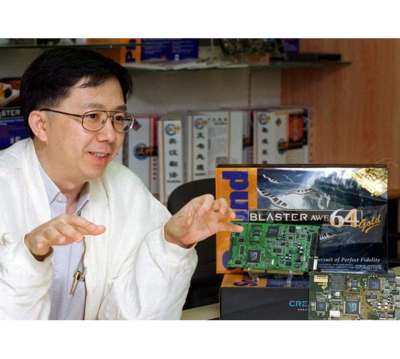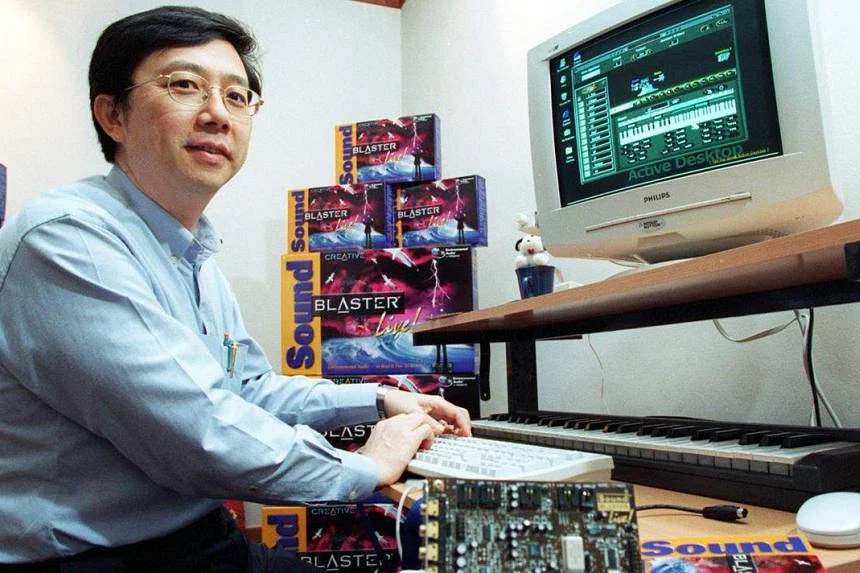| Sound Blaster Creator Dies |
| Written by Sue Gee | |||
| Friday, 06 January 2023 | |||
|
Sim Wong Hoo, CEO of Creative Technology, has died at the age of 67. He brought us the Sound Blaster card, the product that enabled the PC to do much more than simply beep. Nowadays we take PC sound for granted and game developers have the tools they need to create sound effects at their fingertips. This was not always the case. All the original PCs, both IBM's and the clones that derived from it had for sound generation was a speaker and while programmers found ingenious ways of using it creatively it was Creative Technology's Sound Blaster card that was a game changer. When it was launched in 1989 it changed the tinny, lacklustre audio creeping out of PC speakers for better - and forever. By 2019 it was sold 400 million units but perhaps more importantly has set a standard for sound cards in general and the expectation that computers would ship with sound capability integrated, saving most people from the extra step of selecting and installing a sound card. Born in Bukit Panjang, Singapore, Sim was the youngest of 11 children and grew up on a farm. Having graduated in 1975 from Ngee Ann Polytechnic, where he read electrical and electronic engineering, Sim set up Creative Technology in 1981 as a computer repair shop in the Chinatown area of Singapore with his childhood friend Ng Kai Wa. One early project for the company was an add-on memory board for the Apple II computer. Subsequently at a cost of $500,000, Creative developed the Cubic CT, an IBM-compatible PC adapted for the Chinese language and featuring multimedia features like enhanced color graphics and a built-in audio board capable of producing speech and melodies which proved to be a commercial failure. Success came with the shift in focus to music coupled with a presence in the US. Having developed a PC add-on card called the Creative Music System, Sim established Creative Labs, Inc. in Silicon Valley and convinced software developers to support this product, renamed Game Blaster and marketed by RadioShack's Tandy division. It was the success of this audio interface that led to the development of the standalone Sound Blaster sound card, which was introduced at the 1989 COMDEX (COmputer Dealers EXhibition) show, just as the multimedia PC market, fueled by Intel's 386 CPU and Microsoft Windows 3.0, took off. So what was so special about the SoundBlaster? To quote from the article Sound Hardware on this site by Harry Fairhead: Put simply it provided everything you needed to input and create sounds. It had a Digital to Analog Converter (DAC) which in principle promised to allow a PC to make any sound it care to compute, but the real breakthrough was a multichannel FM synthesis chip. Using FM synthesis you could create a reasonable imitation of almost any musical instrument – without putting a heavy load on the CPU. Over its more than four decades Creative Technology has introduced many popular consumer products, but sound generation, particularly drums, seems to have been a particular passion for Sim Wong Hoo In 1992, Creative became the first Singaporean company to list on the US Nasdaq stock market and by 2000, Sim was Singapore’s youngest billionaire at the age of 45. Sim came to worldwide attention in 2006 after Creative sued Apple for patent infringements over the American tech giant's iPod media player. The two companies eventually agreed to settle their legal dispute, and Creative walked away from its David and Goliath encounter US$100 million richer and when Steve Jobs died of pancreatic cancer in 2011, Sim published a full-page newspaper advertisement paying tribute to the Apple co-founder. Today, Creative has offices in Shanghai, Tokyo, Dublin and Silicon Valley, generating sales of US$61 million in 2022 and continues to launch award-winning audio products. After the unexpected death on January 4th 2023 of its founder and CEO Sim Wong Hoo, the president of the Creative Labs Business Unit, Song Siow Hui, has become the company's interim CEO. More InformationCreative Technology, Wikipedia Related Articles
To be informed about new articles on I Programmer, sign up for our weekly newsletter, subscribe to the RSS feed and follow us on Facebook or Linkedin.
|
|||
| Last Updated ( Friday, 06 January 2023 ) |
 To a great extent it was Sim Wong Hoo we can thank for the sound technology computers rely on today. He wasn't the inventor of the sound card - that honor goes to Sherwin Gooch inventor in 1972 of the eponymous Gooch Synthetic Woodwind which was a synthesizer capable of 4-voice music synthesis - but he was responsible for the Sound Blaster, which in its original release was a 9-voice (11 voices in drum mode) synthesizer.
To a great extent it was Sim Wong Hoo we can thank for the sound technology computers rely on today. He wasn't the inventor of the sound card - that honor goes to Sherwin Gooch inventor in 1972 of the eponymous Gooch Synthetic Woodwind which was a synthesizer capable of 4-voice music synthesis - but he was responsible for the Sound Blaster, which in its original release was a 9-voice (11 voices in drum mode) synthesizer.
